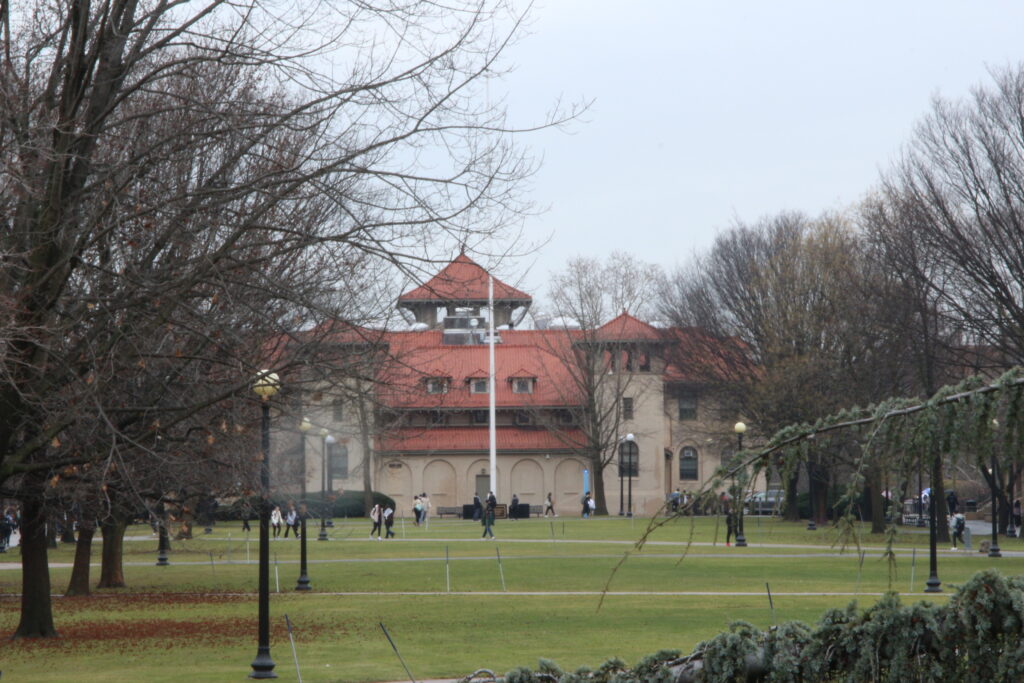By Celia Bernhardt and Charlie Finnerty | news@queensledger.com

Queens College. Credit: Celia Bernhardt
CUNY is one of a few universities in the nation with a pathway to multi-year appointments for adjunct faculty, who traditionally operate on a term-to-term basis with no guarantee of continuing employment.
Now, CUNY’s central administration wants to make that pathway over twice as long, according to Professional Staff Congress (PSC) President James Davis.
A pilot program tucked into Appendix E of the PSC’s previous two contracts with CUNY allows adjunct faculty who have worked at least six teaching hours per semester for 10 of the past 12 semesters to qualify for a three-year appointment.
The program is set to expire at the end of the 2023-2024 academic year. It’s a key piece of ongoing contract negotiations between PSC and CUNY, which have stretched out over a year past their previous contract’s expiration in February 2023.
In the latest bargaining session on February 29, 2024, CUNY proposed altering the plan to require adjuncts to teach 24 consecutive semesters to be eligible for a two-year contract, according to Davis.
A PSC analysis of CUNY data indicated the number of adjunct faculty eligible for multi-year appointments would plummet 87% from 2,450 to 318 under the new proposal. At Queens College, that number would fall from 185 to 35; at Queensborough Community College, from 84 to 19; at York College, from 93 to seven; and at LaGuardia, from 156 to 25.
Kate Schnur, an adjunct who teaches in the English and Women’s Studies departments at Queens College, was at the bargaining table when CUNY made the counter offer. She described the moment as “horrifying.”
“They made it effectively meaningless. To increase the time it takes to earn this contract by 150% and then cut the length of the contract by a third, you might as well scratch [it],” Schnur said. “To watch them say that with a straight face was gutting.”
A CUNY spokesperson said that the university “does not comment on contract negotiations.”
Adjuncts have taught the majority of higher education classes since 2015 according to the Department of Education. The vast majority work without a guarantee of job security — in a 2022 survey of over 1,000 adjuncts by the American Federation of Teachers, 73.9% responded that the length of their average employment contract was only one semester.
“CUNY has been among the leaders in containing the radical adjunctification of the academic workforce,” Davis said. “[Ending the pilot program] would be so harmful — not just to the folks who are in these titles and not just to everybody that we represent — but it would also be harmful to students because they don’t benefit when there’s so much churn and turnover in the instructional staff.”

Student union at Queens College. Credit: Celia Bernhardt
In an internal memo from July 5, 2023 obtained by the Queens Ledger, Vice Chancellor of Human Resources and Labor Relations Doriane Gloria laid out CUNY’s intention to “sunset” the program by the end of the 2024 academic year, at which point adjuncts not yet appointed to a three-year position would cease to be eligible for one.
At a September 20 bargaining session, PSC argued for cementing the pilot program along with the inclusion of a certificate for adjuncts completing at least two multi-year appointments, the inclusion of summer semesters in calculating eligibility for the appointments, and other measures. CUNY left the door open to negotiating on multi-year appointments, according to PSC. Then came the February 29 counter-proposal.
“When they said 24 semesters — and I’m not the only one who said this — I thought, surely I must be hearing wrong,” Schnur said. “There’s no way that’s what they meant. Maybe they meant 24 credits. But no — twelve years.”
Schnur said she was especially concerned for adjuncts who have been working for years towards a more stable appointment.
“You don’t earn this contract the second that you start teaching,” Schnur said. “They’ve been teaching here for five years, with the understanding that they would finally earn job security. And we don’t know if we have that anymore.”
With the program’s end date fast approaching, Davis said he feels there is a lot of work to be done to bridge the gap between PSC and the university administration.
“The union and the university are now engaged in trying to negotiate over a successor to the pilot that is going to expire otherwise,” Davis said. “So that’s where we are now. And we’re very far apart in terms of the vision that each of the parties has expressed so far.”
Budget Woes
The recent twist in contract negotiations comes as CUNY continues to face an ongoing budget crisis. After Mayor Adams’ revised municipal budget this fall cut the public university’s budget by $23 million, CUNY’s central administration ordered eight CUNY campuses — York, Brooklyn, and Queens College among them — to produce “enhanced deficit reduction plans.” Sudden mass layoffs of full-time substitute faculties and other cuts ensued across multiple campuses.
Staff numbers had already been on the decline for years prior. PSC reported that between 2018 and 2022, CUNY’s total number of teaching adjunct positions dropped by 1,072 total — an 8.73% reduction — and that its full-time faculty lines saw a 4.52% reduction, with 333 less positions.
PSC’s Vice President for Part-time Personnel Lynne Turner said she sees CUNY’s proposal as part of a larger trend towards budget-cutting austerity.
“I believe [PSC’s] demands are rooted in the role that the CUNY plays as this engine of social and economic mobility for working class students in New York City,” Turner said. “Unfortunately, it seems that CUNY administration has consistently put forward many demands which seem to be based upon this premise of fiscal austerity and wanting ultimate flexibility.”
Precarious Futures
Davis said that approximately 11,000 adjuncts teach at CUNY at any given time. With 2,450 currently eligible for multi-year appointments, Davis said the remainder are “subject to total, extreme precariousness.”
“It’s just making everything that’s hard about being an adjunct so much worse,” Schnur said. “Because we had something, right? At the very least we had this promise that we would earn job security.”
Davis and Schnur said the risk to adjunct faculty’s healthcare is a major concern intertwined with the proposal. To be eligible for city health insurance, an adjunct has to teach at least six credits or more in a semester after their first year of service. Since the university’s counter proposal would offer less job security for adjuncts, Davis said their health insurance could be just as unpredictable.
“[The health insurance] part doesn’t announce itself as obvious, but it’s actually one of the main things I think our staff thinks about,” Davis said. “There’s just a degree of uncertainty.”
Davis said he still feels hopeful that PSC will be able to establish a strong successor to the pilot program that will ensure job security for the adjuncts they represent.
“I think the university will have to shift its position. I’m still confident that we will land somewhere constructive,” Davis said. “This is a direction that all universities should be moving, and CUNY recognized that when they supported this provision in the first place.”
Turner said she sees CUNY’s counterproposal as part of a larger shift in how the university sees its role in contract negotiations with faculty.
“There was a time when CUNY administration — in bargaining multiple times over multiple contracts — seemed to understand that [the pilot program] was actually something that was a benefit to the university as a whole,” Turner said. “What the counter proposal that they put forward demonstrates unfortunately, is that far too often they seem to be viewing the university now more as a spreadsheet than this place that’s so essential for teaching and learning of working class students in this city.”
This article was updated on March 21, 2024 with additional information.



